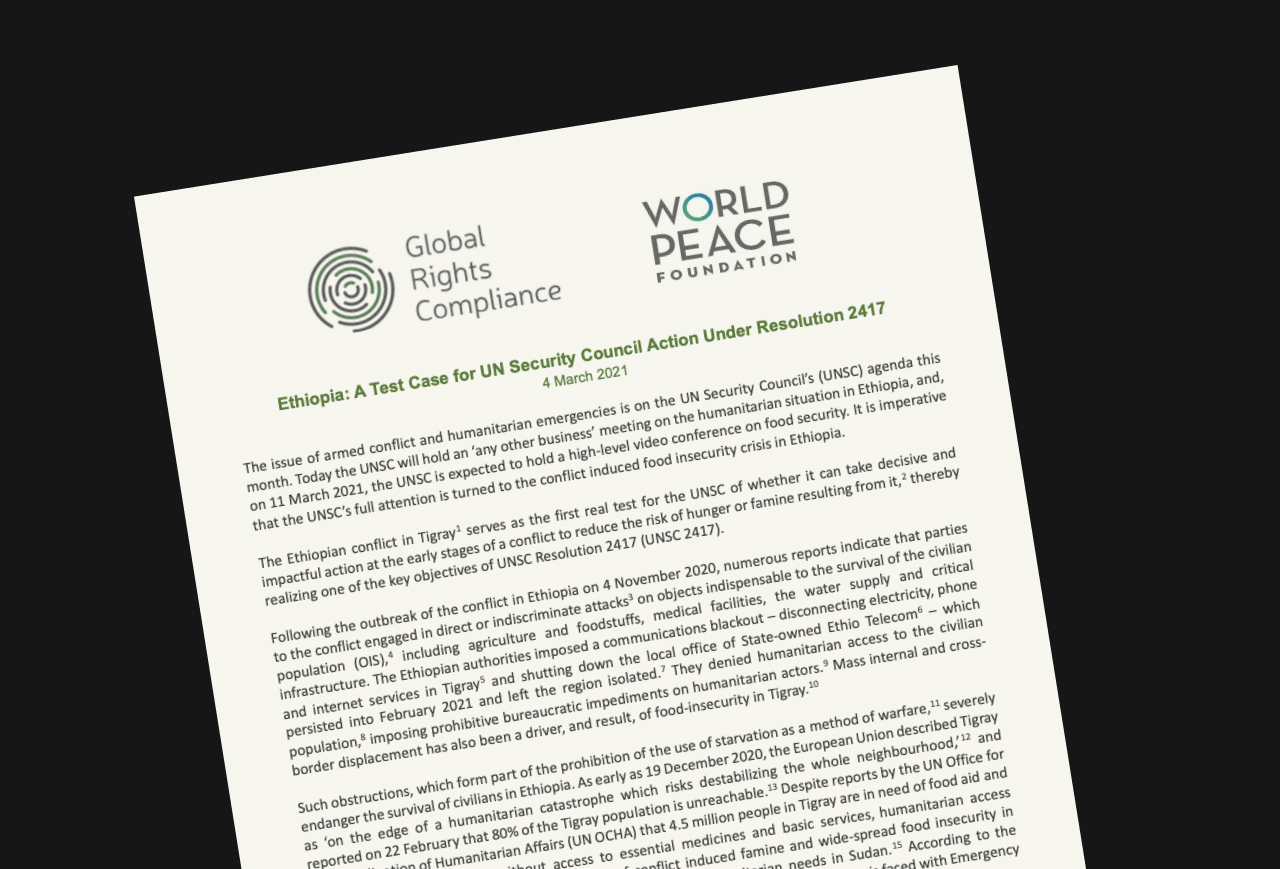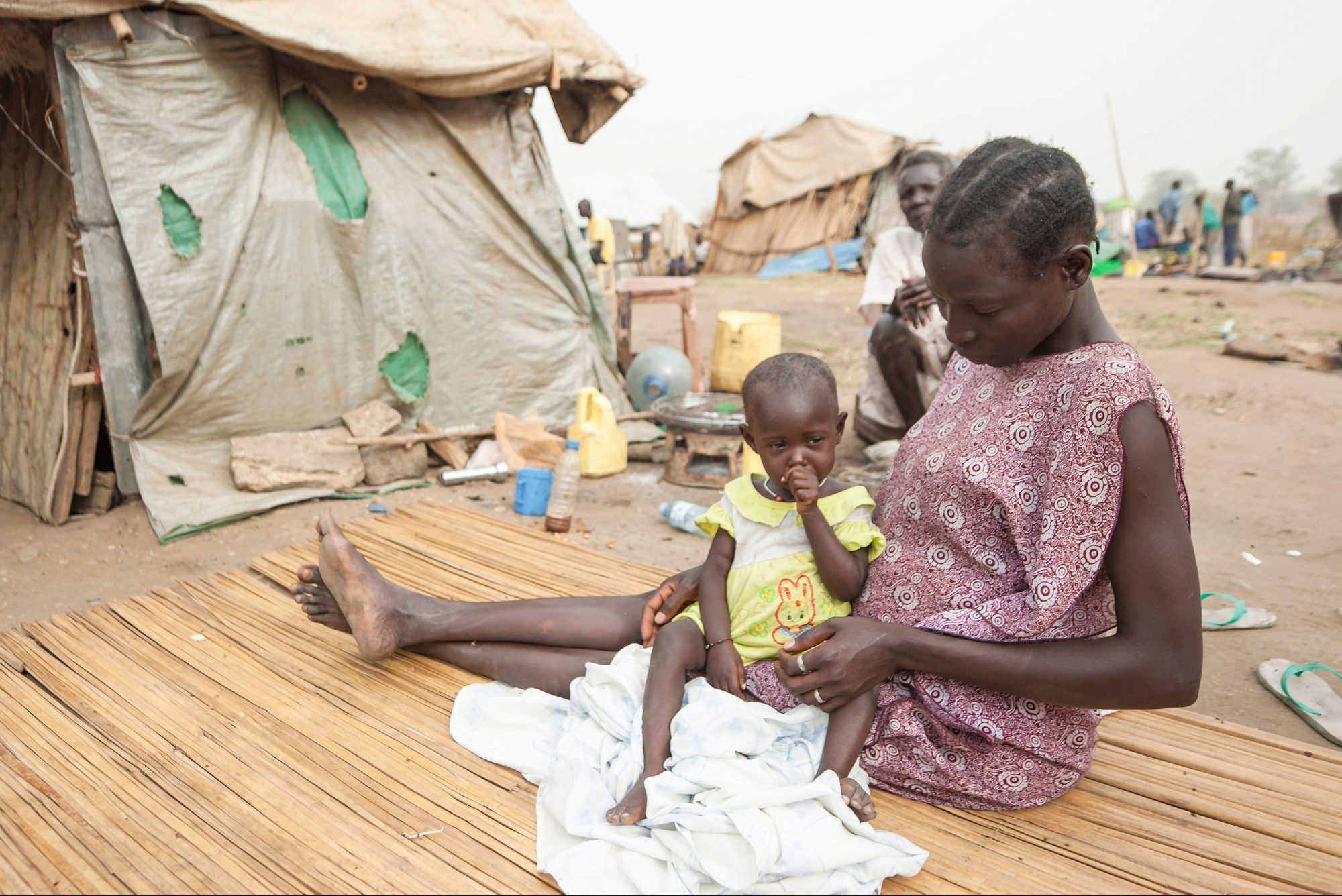Today (March 4, 2021) the UN Security Council is holding an ‘any other business’ meeting, instigated by Ireland, on the humanitarian situation in Ethiopia. Global Rights Compliance and the World Peace Foundation call on the UNSC to take swift, decisive and impactful action under UNSC Resolution 2417 to reduce the risk of famine resulting from the Ethiopian-Eritrean conflict and violence against civilians and civilian targets in Tigray.
Ethiopia: A Test Case for UN Security Council Action Under Resolution 2417
Today the UN Security Council (UNSC) are holding an ‘any other business’ meeting, instigated by Ireland, on the humanitarian situation in Ethiopia and, on 11 March 2021, the UNSC is expected to hold a high-level video conference on food security. In response to these UNSC meetings, Global Rights Compliance (GRC) and the World Peace Foundation (WPF) publish today a paper calling on the UNSC to take swift, decisive and impactful action under UNSC Resolution 2417 to reduce the risk of hunger or famine resulting from the conflict in Tigray, Ethiopia.
According to the UN Office for the Coordination of Humanitarian Affairs, 4.5 million people in Tigray are in need of food aid and hundreds of thousands are without access to essential medicines and basic services.
Since the outbreak of the hostilities on 4 November 2020, numerous reports indicate that parties to the conflict engaged in attacks on object indispensable to the survival of the civilian population and imposed restrictions on humanitarian access, acts which could violate the prohibition of the use of starvation as a method of warfare under international humanitarian law. According to the UN Office for the Coordination of Humanitarian Affairs, 4.5 million people in Tigray are in need of food aid and hundreds of thousands are without access to essential medicines and basic services.
UNSC Resolution 2417, unanimously adopted in 2018, recognized the link between conflict and hunger, condemned the use of starvation as a method of warfare and set out preventative and accountability measures that may be imposed. The conflict in Ethiopia is the first real test for the UNSC of whether it can take early action to realize the preventative objectives of the resolution and reduce the risk of conflict-induced hunger or famine.
In its joint paper, GRC and the WPF call on the UNSC to apply the following measures, among others, with a view to preventing violations of international law and improving the humanitarian situation of the civilian population in Ethiopia:
Establish a UN focal point on UNSC 2417 to report to the UN Secretary General and UNSC on a regular basis, as
well as on an ad hoc basis when threats of conflict-induced hunger arise.
Call on parties concerned, including neighbouring States, to allow and facilitate the rapid, safe, and unimpeded
access of relief personnel, equipment and supplies to all those in need, including internally displaced persons and
refugees, and remove any bureaucratic impediments to the flow of humanitarian supplies.
Call on all parties to the conflict to comply with their obligations under international law, including IHL and, where
appropriate, international human rights law, to respect and protect civilians and civilian objects and humanitarian
personnel and consignments used for humanitarian relief operations.
Strongly urge States, including through the UN Office of the High Commissioner for Human Rights and/or the UN
Human Rights Council, to establish an independent and impartial fact-finding mission to investigate alleged
violations of international law committed by parties to the conflict, including an explicit mandate to investigate
attacks on objects indispensable to the survival of the civilian population, restrictions on humanitarian assistance
and other starvation-related conduct, with a view to preserving evidence and identifying perpetrators, and reporting
swiftly to the UNSC, among other bodies.
Requests the UN Secretary General to report to the UNSC within 30 days, and thereafter every 30 days, on the situation,
including on food insecurity, humanitarian access and any attacks on objects indispensable to survival and other
violations of international law, so that the UNSC may consider such information and take appropriate steps.
Access the full paper: Ethiopia: A Test Case for UN Security Council Action Under Resolution 2417



